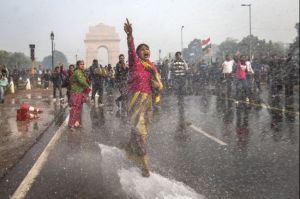 The emotional reaction in the streets of India to the gang rape and murder of the young woman in Delhi is a powerful moral force, a show of solidarity with her, her family and other victims of sexual violence.
The emotional reaction in the streets of India to the gang rape and murder of the young woman in Delhi is a powerful moral force, a show of solidarity with her, her family and other victims of sexual violence.
Were it not for this pressure, the suspects may very well have escaped unpunished, as happens in so many other cases in India (and elsewhere, of course). The government knows it has to act quickly to bring these suspects to trial and introduce measures to protect women from sexual assault.
What is interesting about the emotional basis to the groundswell of moral support is that emotions are normally thought to hinder moral decision-making. Here they surely aid it.
Belief in antipathy between emotions and moral decisions is the backbone of the Western judicial system. Judges, as a matter of course, instruct juries to make decisions on an impartial assessment of the evidence, and ‘without sympathy, prejudice or fear’.
For example, the jury of the famous O.J. Simpson trial was instructed: ‘You must not be influenced by mere sentiment, conjecture, sympathy, passion, prejudice, public opinion, or public feeling.’
There was nothing mere, however, about the sentiment, sympathy, passion, public opinion and public feeling, among those who took to the streets in support of this young woman.
This suggests that the role of emotions in moral judgments is worth reconsidering.
To this end, I want to draw on David Pizarro’s article ‘Nothing more than feeling? The role of emotion in moral judgment’. Journal for the Theory of Social Behaviour, Volume 30 Issue 4 Page 355 – December 2000.
Pizarrro outlines conventional wisdom on the relationship between emotions and morality. It is known within popular culture in the form of Star Trek’s Mr. Spock, for whom emotions are illogical. Pizarro condenses the conventional view into this syllogism:
- emotions are always partial, arbitrary, and passive,
- moral judgments should be impartial, well-grounded, and freely made, therefore
- emotions are detrimental to moral judgments, and are to be avoided in moral decision-making (Pizarro, p. 258).
Pizarro then draws on recent knowledge about emotions to argue that the conventional view in untenable.
- Emotions are not always partial, arbitrary and passive.
- Emotions, moreover, reflect moral beliefs and principles; they are not raw responses to situations.
- Emotions can actually aid reasoning by focusing our attention and cognitive resources on the problem at hand.
The Delhi rape and murder is a good example of this alternative view. The emotional reactions of protestors alerted them to the presence of a moral issue and as long as they stand united, it will not go away.
Pizarro allows that, in some circumstances, emotions can undermine moral decision-making, but ‘in the light of our understanding of emotion and emotional processes’ (p. 358)‚ he questions the belief that they can never aid, and always harm moral judgment. Indeed, he argues that, knowing what we now do about emotions, they are desirable for the process of moral decision-making.
Central to Pizarro’s argument is our capacity to regulate our emotions. This ‘is what gives us the ability to defeat the partial, passive and arbitrary nature of emotions when necessary, in order to fulfill a moral goal’ (p. 370). This capacity ‘allows us to utilize their influence to serve our higher-order moral beliefs, as an energy source of moral judgments and actions’ (p. 371); Pizzaro’s point is that, in some circumstances, affective arousal and moral beliefs may complement each other.
Interestingly, a similar argument has been made in support of angry judges. [See ‘Are angry judges better than “robots“?’
Pizarro develops a theory of emotive moral judgment by examining empathy, which he understands as the experience of feelings/emotions similar in kind to those expressed by or known to exist in another person. Empathy is a moral emotion because it causes concern for the welfare of others. Put simply, we feel for the other.
Feeling empathy is a moral signal or marker. It sensitizes us to the distress of the other. It cues the individual to the possibility that a morally relevant event is taking place.
A feeling of empathy is not at odds with moral beliefs, rather, it embodies them. Empathy rests upon previously formed moral beliefs and attitudes, i.e., the cognitive antecedents of empathetic arousal. Emotional reactions, or the lack of them, reveal moral priorities. [Perhaps this is what President Obama has in mind by ‘empathy deficit‘)
When a person feels empathy, the empathic arousal leads to motivation to make a moral judgment.
Pizzaro allows that empathy can sometimes lead us to violate a moral principle. However, a capacity to experience empathy plus an ability to regulate it effectively are necessary to be a moral person.
Interestingly, for such an important quality, the Oxford English Dictionary tells us that ’empathy’ is a little over one hundred years old.
Here then is a framework to be tried and tested in analysis of the unfolding drama in Delhi.
To that end, does it work, does it help?
Pingback: Who Am I? | THE SCARECROW